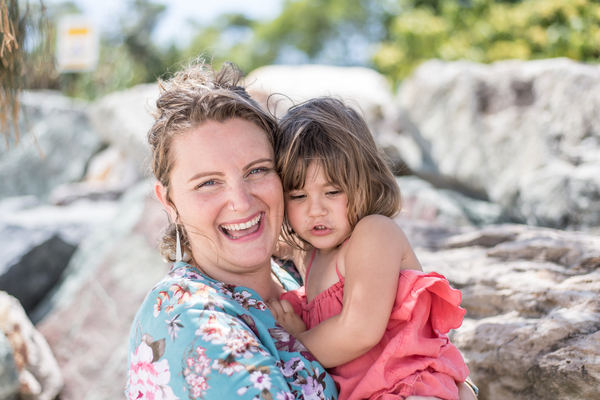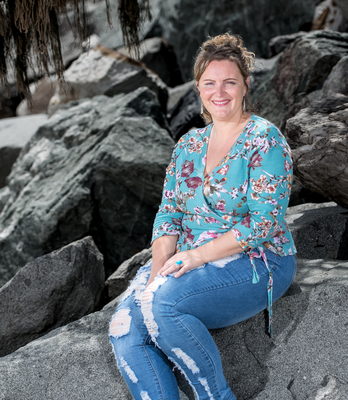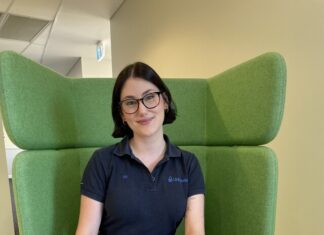A man who has witnessed a nation in transition across seven decades has stories to tell – stories that disappear once his frail, 70-year-old body gives out from illness. With his daughter curled up on a recliner at his side and a beloved cat snuggled into his feet, just as she had done on all other nights, his nurse prepared for his last moments. A wife and son held strong, knowing the man’s stories would only continue through them after that evening.
After holding each other through the man’s last breath and shedding tears together, palliative care nurse, Amy Cadd drove away from the people who she had met only a few days earlier with tears trailing down her cheeks. Full of gratitude that she had been able to hold space for them during their most vulnerable, private moment, she headed home to her three children and husband, tucked up in their beds.
I talk with Amy about how she finds joy and meaning in a life lived where her work is spent in the shadow of death, literally.
“As far as how it feels, I feel honoured to be in the homes and lives of these people and their families. It’s a privilege that I don’t take lightly,” she says.
“To be with people while they are dying or after they have died is very special. The depth of relationship that is formed with the dying person as well as their loved ones is wonderful, and I value that immensely.”
Palliative care came about initially from hospice care, which is end-of-life care. The palliative part was intended to make patient’s lives more comfortable, to reduce suffering and increase quality of life.
Palliative care nurses need to cope with death, but they also need to learn to cope with personal loss. The nature of the care nurses’ work revolves around loss, and that can lead to them bearing a large burden which can affect their livelihoods.
“It definitely has the potential to wear me down. But there is so much that also enriches me, and this work feels so natural. I am deeply inspired by the courage and growth I witness in my clients and their loved ones. Conversations and time shared with clients guide me to be present and grateful for the good things and not get caught up in superfluous distractions.
“This work keeps me very grounded, and reminds me to value my family, friends, community and the beauty of our natural surroundings. Being part of an amazing team at Little Haven also allows me to express my emotions and frustrations authentically – we all look out for each other really well.”Age and experience have taught Amy to recognise when she needs to step back and to step up with her own self-care.
“This can include time spent at the beach, fun activities with family and friends, and immersing myself in creative arts like dance, music, writing and art. It’s important to be nurtured, as we can’t give from an empty cup.”
Acknowledging her grief is something Amy has also learned to master. A weekend of sharing sacred time with her clients and their families in their homes, as two souls pass away peacefully, pain-free and surrounded by their loved ones, is not something many of us could take on and I ask her why does she want to do this?
“I initially got into Community Nursing 12 years ago – I truly underestimated firstly how complex and specialised it would be, and secondly how much I would love it. That was my first introduction to Palliative Nursing and it was life-altering,” she says.
“I form genuine connections and care, and I feel the loss. It doesn’t mean I shouldn’t do this work, it means that I’m doing it properly.”
Holding space in the dying process for families seems a monumental task difficult for me to grasp. Predicting what the fundamental needs of each different family will be is a gift which, surely, cannot be taught.
“It’s as unique as each person is. Each person’s journey brings it’s own challenges. Sometimes they require space and silence and others settle best with the laughter and chatter of family all around them. For me, I use a combination of my Nursing assessment experience, my intuition and listening, to work out how best to assist each family.”
Throughout her extensive nursing career, Amy has worked in various fields and environments including Hospitals, Clinics, Mental Health Facilities, a Maximum Security Prison and her favourite – the Community. She is passionate about positive palliative outcomes and experiences for clients and their families and about sharing some of the ways we can sensitively journey with, and hold the space around death and dying.
These days, Amy shares the life lessons she learns daily from the people who inspire her the most, her clients, with the public. Through a series of Ignite Sunshine Coast talks, she has been able to voice that this is a topic less about “death-denying” and more “death positive.”
“The response has been very positive and encouraging. It’s heartening to know that people are keen to know and learn more about end of life care and how they can perhaps prepare themselves better for what can be a very challenging and vulnerable time in our life journey,” she says.
Surveys consistently show that around 70 percent of Australians wish to die at home, and yet in some areas less than 20 percent actually do.
“Myself, along with my colleagues both at Little Haven and beyond are keen to reconcile the discrepancy between these statistics. I hope that by providing a safe space to talk about a topic that has been traditionally taboo, it can assist people to be empowered with informed choices and positive experiences.”
Amy held a workshop in Brisbane recently on “Holding the Space of Dying” and received many messages and requests to hold more.
By popular demand, she will host two workshop sessions in Tewantin on 4 November called “Demystifying Death” – a light and non-confrontational information session to bring awareness and understanding to assist in supporting those dealing with or wanting to know more about the dying process.
“I know it can be challenging to talk about death and dying, but the more we know the better we can deal with the inevitable,” Amy says.
We rarely stop and think about the unusual ways some Australians earn a crust and what it is that drives and sustains them when their work pushes them to their emotional or physical limits.
Amy possesses a unique combination of incredible strength and resilience with a truly engaged heart, which enables her sincerity to translate to the families she cares for in their darkest hours.
“Working in palliative care gifts me with the continual reminder to be grateful for each day and each precious member of my family and friends.
“The abundance of life, energy and joyful exuberance in my children beautifully balances the natural gentleness and stillness of dying, and when I encounter scenes like this that take my breath away, I am reminded to be grateful and breathe in the magic of the moment.”









